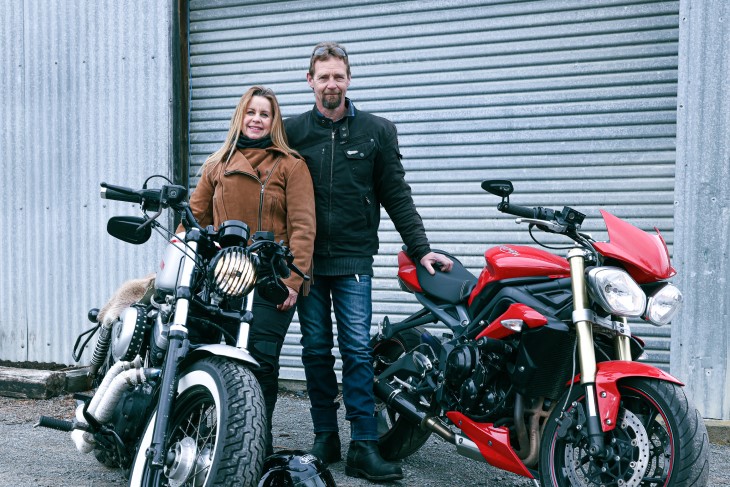Steve’s story: ‘I’ll never stop riding’
It would take more than a serious accident to keep experienced rider Steve Davies off the road. To help others stay safe, Steve‘s sharing the story of how he nearly lost his life as we celebrate Motorcycle Awareness Month.
Steve Davies remembers the day of his crash like it was yesterday.
The 48-year-old from Wellington was out riding with a group of mates, heading from Porirua to the Wairarapa, up to Waiouru, and then down to Whanganui for lunch.
It started raining which made conditions more difficult, with large patches of tar bleed on the road. There were six bikes ahead of him in convoy and Davies was the tail-end rider as they headed towards Hunterville on the rural back roads.
He was coming around a left-hand corner and could see a patch of slippery tar bleed ahead. As he moved to the right to avoid the worst of it, his bike slid from underneath him.
“I couldn’t believe what had happened,” he says.
“I was riding along and then my bike slid over in the wet conditions at 80km per hour. I hit the road. I just remember this loud bang and the sound of my bike scraping on the tarmac.”
The father of three knew he was in trouble. He was in pain but the adrenaline coursing through his veins meant he could get off the road while his friends called an ambulance.
“I just remember lying on the road and the pain in my shoulder and collar bone. I moved my right shoulder up and down and could feel things moving around inside and thought, ‘Well, that’s not good.’”
When help arrived two hours later, he was taken to Whanganui Hospital where he spent three days in the Intensive Care Unit (ICU) before being airlifted home to Wellington Hospital.
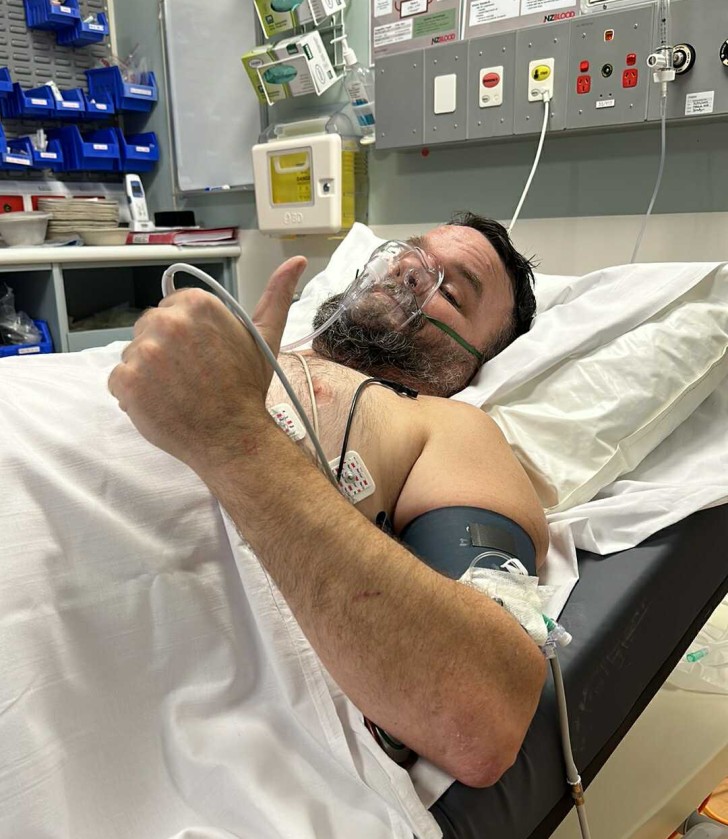
‘It could’ve been much worse’
Steve was fortunate to be alive.
He’d suffered a broken collarbone in two places, six broken ribs and a collapsed lung. Even through a helmet, he had bruising on his head, and all down one side of his body.
Steve says part of the Ride Forever training is wearing the right gear and riding prepared.
“I was wearing full protective gear and I know without a doubt it helped minimise the extent of my injuries. What could have been far worse was made survivable because I’d listened to that advice and invested in the right equipment,” he says.
“I realised it could’ve been much worse. It was a significant crash, and I’m lucky I’m here to tell the story. It was a huge shock, not just for me, but also for my friends and family.”
After being discharged from hospital, Steve began his long road to recovery. He spent five weeks working through physiotherapy to improve his movement.
But the accident didn’t just cause physical injuries. It left a lasting impact on his loved ones, especially his wife.
“It caused worry and stress long after I was back on my feet. Every time I get back on the bike, I can feel it,” he says.
“For them, the risk is always there, and that reminded me how my riding choices impact more than just me. My return to riding has meant re-evaluating my protective gear, my riding skills and how I approach a ride.”
That wider impact of his injury on friends and family is why Motorcycle Awareness Month is so important to Steve.
“It’s not only about riders thinking and acting more carefully, but also about reminding everyone on the road that your safety has a ripple effect. Behind every rider is a family or community who cares deeply about them.”
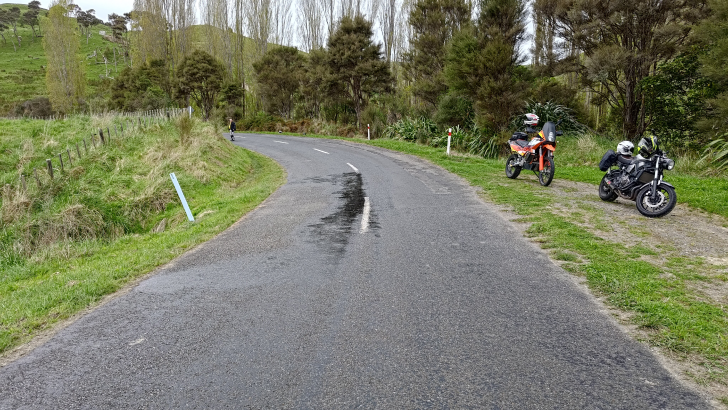
The tar bleed on the corner where Steve suffered his accident.
Workplace connection plays key role in recovery
Steve says ACC has been a huge support throughout his rehabilitation.
“I couldn’t ask for anything better really. You hear those horror stories of people living over in the United States and the costs of their medical care and support for a serious injury,” he says.
“We’re lucky to have that support here in New Zealand. Their support meant I could focus on my recovery and get back to an independent life as soon as possible.”
Steve works as a solution architect in the government IT space. He says his recovery at work plan was a huge help for him.
He was able to return to work on modified duties just seven weeks after his accident.
“That was great for me,” he says.
“I hated being off work and I couldn’t wait to get back. Being connected with the team again helped me socially and mentally.”
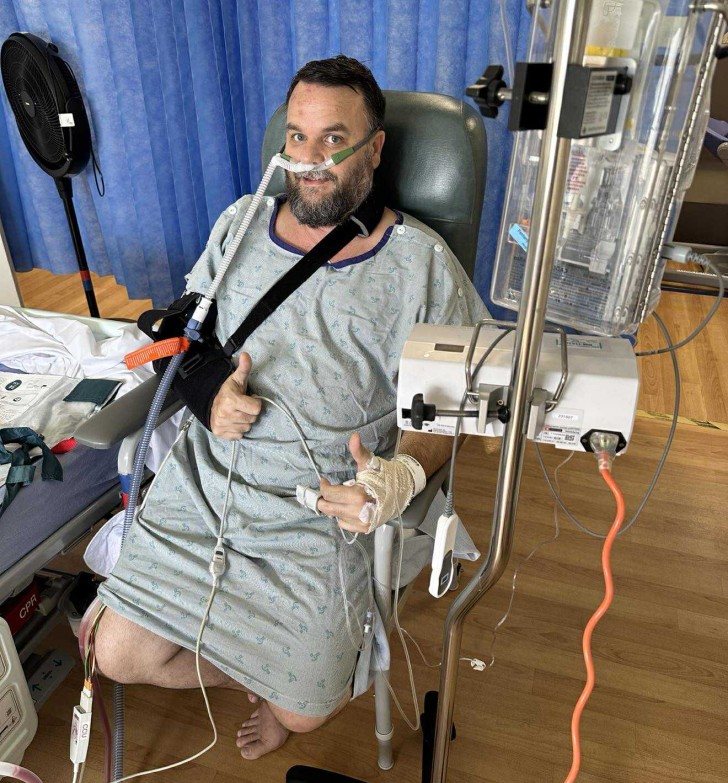
The importance of awareness
The biggest thing Steve took from his accident experience was the importance of awareness while riding.
“It’s so important to be fully aware of the conditions and how they can change, especially in wet weather and just making sure you’re in a safe position on the road.”
He’s also upgraded his safety gear to include an air-bag vest and higher spec helmet.
Steve says the Ride Forever training courses he was attending helped greatly – without the skills he learned, there could’ve been a very different outcome.
“They increased my awareness while riding, of other vehicles but also road and weather conditions,” he says.
“We’d made the call to slow down and take it easy. Obviously, it didn’t stop the accident but it reduced the damage, for sure.”
Ride Forever is an ACC initiative aimed at improving rider skill through training and resources.
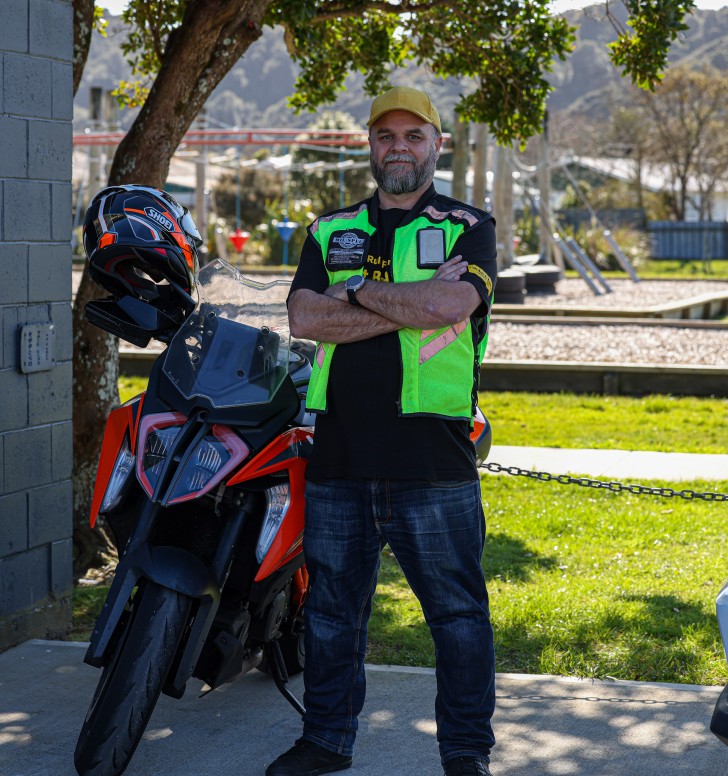
Passing on a passion for riding
A few months after the accident, Steve qualified as a motorcycle riding instructor. He delivers Learn to Ride and Ride Forever courses, as well as basic handling skills tests, with the Two Bald Bikers team in Wainuiomata.
“I have a huge passion for riding and have learned a lot over the years, so it’s nice to support others in their riding and be part of that community,” he says.
The accident has made him want to help other riders become better at doing what he loves.
Once he was fully healed and his bike was repaired, Steve couldn’t wait to get back out on the open road.
“Motorbike riding is in my blood and that’s never going to change. I love being in that environment, you take in your surroundings so much more. I love that feeling of full freedom,” he says.
“Of course, there were a few nerves getting back on the bike after the crash, but it was mostly excitement and the joy of being back out there.”
Ride Forever courses ‘an absolute must’
Every year without fail, Steve and his riding friends complete silver and gold Ride Forever courses. He considers them an absolute must.
“You’re always learning,” he says.
“I’m always picking up new things and having good conversations with people. I love riding so I want to do all I can to make sure it’s as safe as possible. Ride Forever gives you the practical skills you need to do that.”
Every September, ACC joins with partners to support Motorcycle Awareness Month. More than 50 per cent of motorbike riders de-register their bikes and put them away over winter but that changes in spring.
“As we come into September, it’s a great time of year and we want motorbike riders to celebrate their love of riding and get back on the open road,” says ACC injury prevention leader James Whitaker.
“As you get back on the bike, make sure you’re ready to get the most out of the riding season.”
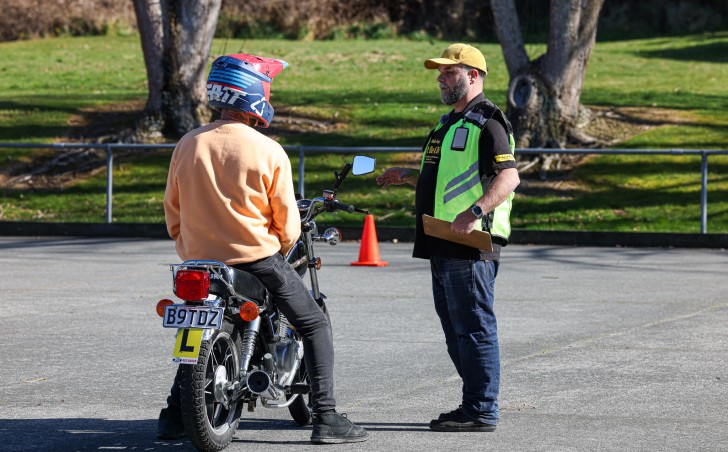
Motorcycle Awareness Month
In 2024, ACC accepted 4,739 motorbike-related injuries at a cost of $150 million to help people recover. This was the highest number of injuries and the highest cost in the past five years.
“Our data shows riders who’ve completed a Ride Forever course are up to 50 per cent less likely to lodge a motorbike-related accident claim than non-trained riders,” James says.
“Riders trained through Ride Forever crash less often, and the crashes they do have are less severe on average.”
Motorcycle Awareness Month is supported by ACC, the Motorcycle Safety Advisory Council (MSAC), NZ Police, local councils and NZ Transport Agency Waka Kotahi (NZTA).
This Motorcycle Awareness Month, get ready for your ride by doing these three things:
- Check your bikes are well-maintained
- Ensure your gear is up to scratch
- Refresh your skills by completing a Ride Forever coaching programme
More information is available on the Ride Forever website.





